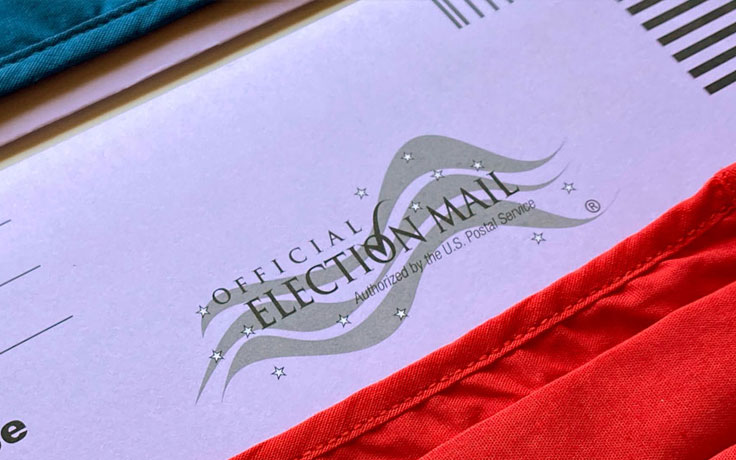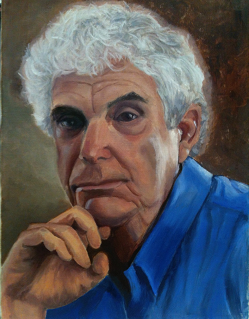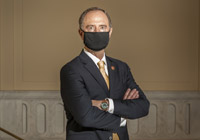A WIDE STRETCH OF SUBURBIA north of Los Angeles, reaching from hills near the Pacific Ocean to the desert, is a perfect laboratory for examining how COVID-19 is changing politics and governance in the United States. What it reveals is distressing.
Officially, this is California’s 25th Congressional District. It reflects much of the state and, indeed, the nation. Homes range from affluent to modest. They are evidence of societal stability and economic striving. There are two state correctional institutions in the area, one in the district and the other nearby. They are evidence of misery and danger. This is Middle America, only an hour from my home in the city.
I have been drawn to this place over the years to report on the Great Recession and other national crises. What I found now is that the coronavirus pandemic is not only damaging national health but also threatening the process that is the lifeblood of democracy — voting.
As I studied the district and the impact of the pandemic elsewhere, I wondered whether this country would accept the results of voting held under such extraordinary circumstances. That may be the most important question of the November election.
The 25th District is feeling all the pressures of COVID-19. Without warning, the pandemic has changed expectations of voting behavior. Because of the pandemic, people will want to avoid polling-place crowds. Poll workers tend to be older and more susceptible to the virus. They may be reluctant to show up. Voting in a neighborhood booth might be a thing of the past.
A shortage of experienced workers, the closing of many polling places and new computerized vote-counting systems with potential flaws have already led to long lines in recent elections. Counting the vote may stretch into days or weeks. In the November election, these obstacles could prevent untold numbers of Americans from cast- ing ballots or having their votes counted.
In addition, there have been the constant, overheated attacks on the electoral system by President Donald Trump, who has portrayed the process, especially voting by mail, as crooked. He declared, without offering any evidence, that the 2020 election “will be, in my opinion, the most corrupt election in the history of our country, and we cannot let this happen.” Actually, voting by mail has been remarkably clean, according to almost all studies.
To make matters even more chaotic, Trump at one point suggested that the election be delayed. And he has threatened the funding and oversight of the United States Postal Service, crucial to mail-in voting.
The 25th District is typical of the mostly White areas Trump is targeting with his warnings that Democrats want to destroy the suburban lifestyle. The district has 714,313 people; 404,306 of them are registered voters. Of the population, 63.7% is White, 37.9% Latina/o, 8% Asian and 7.7% Black. By registration, 36.48% are Democrats, and 31.67% are Republicans. It is a middle-class district, with a median income of $68,551. College graduates are a 25.8% minority. Four years ago, Hilary Clinton defeated Trump here by 50% to 43%.
In 2018, Democrat Katie Hill was elected to Congress but resigned amid accusations of sexual misconduct. In a special election to replace her, Republican Mike Garcia defeated Democrat Chris- ty Smith, and he is completing the rest of Hill’s term. They will face off again on Nov. 3.
Like the rest of Los Angeles County, the 25th District has been hit hard by COVID-19. Among its comparatively small population centers, Palmdale had almost 3,000 cases, Santa Clarita almost 2,500 and Lancaster about 2,400. In Los Angeles County, cases total more than 215,000.
When Republican Garcia won in the special election, there was a large vote by mail. In fact, that is how most voters, aware of the pandemic, cast ballots. In California, as in a small number of other states, each registered voter is mailed a ballot, which is to be filled out, then mailed, turned in at a drop-off spot or left at a polling place. A variation of this, used in more states, is an absentee ballot, where the voter must request one.
Republicans in the 25th District in particular were receptive to voting by mail. County officials mailed 135,342 ballots to Republicans and 46% were returned, according to the data collection firm Political Data Inc. Of the 164,993 mailed to Democrats, 32% were returned.
Older voters were more diligent about returning their ballots — 56% for those 65 and older, in contrast to 40% for those 50 to 64.
These figures and Republican Garcia’s victory in the special election on mailed-in ballots show how out of step Trump is with the GOP electorate in the 25th District. By attacking mail-in voting, Trump is going against what he perceives to be his base – older Republicans.
The district as bellwether
ROB STUTZMAN, A REPUBLICAN CAMPAIGN consultant and Trump skeptic, has written in the Washington Post that, while “it’s never wise to draw big conclusions from one-off events, the clear lesson in California’s 25th Congressional District is this: It is time for Republicans to get on the vote-by-mail train. The race in Southern California suggests that voting by mail can help Republicans win.”
Republicans, Stutzman said, have been active voters by mail for years. Part of the reason is generational. Republican voters are older and frequent users of the mail. “They still mail Christmas cards,” he said.
Then why, I asked him on the phone, does President Trump oppose vote-by-mail?
“He wants to present narratives to cast doubt on an election that he will lose,” Stutzman said, and to “create doubt among millions of Americans that it was a legitimate election. I think it is really important to push back on this.”
Women and men doing the important work of running elections aren’t well known to the public. Immersion in the mechanics of voting has not been a road to fame. It is regarded as the work of nerds.
But the mechanics of elections, it is clear in the 25th District, are just as important as the glamour of the campaign trail and the excitement of watching the results on election night. More election-process experts are needed to avoid a new crisis.
UCLA: Protecting the right to vote
One such effort is the UCLA Voting Rights Project, part of the university’s Latino Policy and Politics Initiative. It was founded in 2018 by civil rights attorney Chad W. Dunn, a UCLA law school faculty member, and Professor Matt Barreto, a UCLA political scientist and an expert on political behavior. Their goal is to bring new people into the little-known elections field and, as their website puts it, to train young lawyers and expert witnesses in voting-rights litigation, develop new theories to pursue voting-rights cases and advance “voting rights through national and local policy.”
As the coronavirus spread early this year, it seemed certain to Barreto, Dunn and their col- leagues that the pandemic would immediately influence campaigns and elections, where people are in close contact at rallies, precinct walking and meeting candidates, as well as voting. COVID-19, with its devastating impact on communities of color, would be a new obstacle, and a big one.
“Given the urgency and importance of the fair and safe administration of the 2020 general election,” the Voting Rights Project reported, “states and Congress must act immediately to address the significant and novel challenges posed by COVID-19 … [or] interpersonal contact avoidance will persist in discouraging large-crowd, in-person voting for some time.”
The project’s most significant recommendation was for voting by mail, which had become so important in the 25th District. “The federal government must mandate that any state receiving COVID-19 or other relief funds should prepare to allow all eligible voters to vote by mail. … In addition, safe and expanded in-person voting should continue within guidelines recommended by public health professionals.”
Another major study was led by one of the nation’s foremost election authorities, Professor Richard Hasen of the University of California, Irvine, who convened leading scholars and election experts to discuss how to assure that the 2020 election will be accepted by the public. Hasen’s latest book, Election Meltdown: Dirty Tricks, Distrust and the Threat to American Democracy, shows the damage inflicted on elections by Republican voter suppression, aimed at reducing the Democratic vote; incompetent election ad- ministration, often in Democrat-run big cities; and both high-tech and old-fashioned dirty tricks.
Hasen’s group formed the Ad Hoc Committee for 2020 Election Fairness and Integrity, consisting of more than two dozen academics from universities including Princeton, MIT, Stanford and UC Berkeley. It raised the most troubling question of the election: Will the results be accepted by the public?
“Even before the worldwide COVID-19 pandemic arrived in the United States, close observers of American democracy worried about the public’s faith and confidence in the results of the upcoming November 2020 U.S. elections,” the group reported. “Although a decade ago concerns about peaceful transitions of power were less common, Americans can no longer take for granted that election losers will concede a closely fought election after election authorities (or courts) have declared a winner.
“Current American politics feature severe hyperpolarization and an increasingly partisan media and social media environment. Mistrust is high. It is harder for voters to get reliable political information. Incendiary rhetoric about rigged or stolen elections is on the rise, and unsubstantiated claims of rigged elections find a receptive audience especially among those who are on the losing end of the election. American elections are highly decentralized, leaving pockets of weak election administration, which can further undermine voter confidence in the process. The COVID-19 pandemic, which hit the United States hard beginning in March 2020, has only exacerbated concerns about the fairness and integrity of the 2020 elections.”
The committee said partisan divisions about whether vote-by- mail should be encouraged have been exacerbated by new concerns about the financial viability of the U.S. Postal Service, which delivers mail-in ballots. “Further, it is easy to imagine election misinformation related to the virus — such as false information about the safety of voting machines, polling place closures, or election delays — confusing voters and potentially undermining voters’ confidence that a fair election may be conducted. … It appears that virus-related concerns will put extra strain on already stretched election administrators seeking to conduct elections in a fair, safe, and inclusive manner and in a way that will lead American voters to have confidence in the vote count.”
The group’s most original suggestion was election lessons for journalists. It recommended “training and coverage planning to help reporters and media outlets appropriately set expectations before the election and to accurately report on events as they develop. These efforts are likely to provide the strongest defense against misinformation about the electoral process or false allegations of widespread voter fraud, which media outlets should of course also seek to avoid amplifying.”
The academics also recommended ending the traditional race among reporters to be first with the results on election night. Be willing, the committee said, to explain that it is too early to call a race, and that a slow count means officials are being careful. “Forecasts and exit poll projections are frequently incorrect; avoid emphasizing them for fear of affecting turnout or causing unfounded suspicions of fraud if they miss the mark.” The group urged reporters to explain that shifts in vote margins are routine while mail-in ballots are counted — and are not indicative of fraud. It also asked them to explain that vote counts continuing beyond election day are normal, and that errors and delays are not necessarily indicators of nefarious intent.
This places a heavy responsibility upon journalists, especially old-school reporters who say their only job is to report the news. But this election will ask much from everyone — senior citizens summoning the courage to run a polling place in the 25th Congressional District, election officials working seven days a week to avoid an election-day disaster, and politicians who must be calming rather than disruptive influences.
All of us have important roles in preserving democracy during the singular age of COVID-19.
























